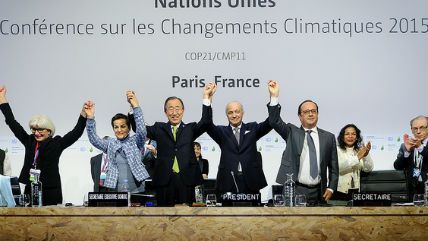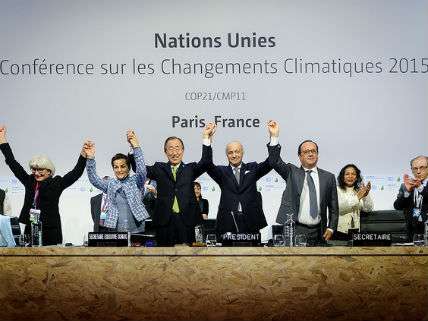A New Central Plan for the Climate
Representatives of 195 countries hammer out an emissions accord in Paris.


When a universal agreement was adopted at the Paris climate change conference on December 12, 2015, President Barack Obama hailed the pact as "the best chance we have to save the one planet that we've got." But the approbation was not universal. The activist and climatologist James Hansen, often described as the "father of climate change awareness," rebuked the Paris negotiators. "It's just bullshit for them to say, 'We'll have a 2°C warming target and then try to do a little better every five years,'" he told The Guardian. "It's just worthless words. There is no action, just promises."
Hansen dismissed the agreement because its cuts to greenhouse gas emissions are not mandatory. In fact, the key to getting 195 countries to approve the Paris Agreement was that—unlike earlier climate pacts—it is based on a non-zero-sum bottom-up process. Countries were not told what to do; instead, each one proposed for itself the steps it would take to combat man-made global warming. Eventually, 186 countries voluntarily submitted "nationally determined contributions" outlining their plans for managing future emissions.
The new agreement sets the objective of "holding the increase in the global average temperature to well below 2°C above pre-industrial levels and to pursue efforts to limit the temperature increase to 1.5°C above pre-industrial levels." Its long-term goal is to peak global emissions of greenhouse gases (chiefly carbon dioxide released by burning fossil fuels) as soon as possible. Thereafter, countries are to pursue rapid reductions so as to achieve net zero emissions by the second half of this century.
The future temperature goals were set based on computer climate models in which the global average temperature could increase as much as 5 degrees Celsius by 2100 if countries continue to ramp up their use of fossil fuels. Various groups calculate that the emissions cuts pledged under the Paris Agreement would still boost average temperatures between 2.7 and 3.5 degrees Celsius by that year. The differences in the estimates depend on assumptions about whether countries will speed up their rates of decarbonization.
For context, keep two figures in mind. First, the global average temperature at the coldest point of the last ice age, 20,000 years ago, is estimated to have been only about 4 degrees Celsius below pre-industrial temperatures. Glaciers then covered about 25 percent of the earth's land surface, and the sea level was about 400 feet lower than today. Second, using satellite temperature measurements, researchers at Remote Sensing Systems (RSS) have found that the warming projected by climate models is two to three times higher than the actual rate at which tropospheric temperatures have increased in the past couple of decades. RSS notes that those temperatures are increasing at a rate of 0.13 degree Celsius per decade. If this were to continue for the next 85 years, the average global temperature would rise by a comparatively moderate 1.1 degree Celsius.
Countries will have regular opportunities to update their nationally determined contributions according to what science is saying about the pace and intensity of man-made warming. If the trend in global average temperatures continues along the low trajectory measured by satellites, world leaders may be able to scale back their commitments.
According to calculations from the World Resources Institute, keeping future temperatures below the 2 degree Celsius threshold will require the world to stop burning coal, oil, and natural gas to produce energy sometime between 2060 and 2075.
The Paris Agreement "marks the end of the era of fossil fuels," asserted May Boeve, executive director of the climate change activist organization 350.org, in a statement. "There is no way to meet the targets laid out in this agreement without keeping coal, oil and gas in the ground. The text should send a clear signal to fossil fuel investors: divest now." This may already be happening. As of December 2015, the Dow Jones Coal Index was down 96 percent from its 2011 highs. The Stowe Global Coal Index was down 87 percent.
The key to getting the governments of poor countries to buy in was the promise that the governments of rich countries would provide substantial monetary aid. Under the agreement, developed countries are supposed to mobilize $100 billion in climate finance annually by 2020 and scale up from there. How much more might developing countries want? Most poor countries submitted plans conditioned on how much cash rich countries would be willing to give them. The think tank Carbon Brief has calculated that the funding needed to fulfill developing country pledges could amount to as much as $3.5 trillion between 2020 and 2030.
Rich countries got most of what they wanted with regard to being able to monitor and verify that the signatories are doing what they said they would. Countries are required to file a national inventory report of emissions and removals, plus any other information necessary to track the fulfillment of their pledges. In other words, each country is legally bound to accurately tell the others how it's doing.
To avoid triggering constitutional scrutiny of the Paris Agreement by the U.S. Senate, it is being styled domestically as "enhancing the implementation" of the already ratified U.N. Framework Convention on Climate Change (UNFCCC). The president apparently plans to argue that he doesn't need approval because the agreement features voluntary targets alongside its obligatory reporting procedures. The legally binding accounting provisions are supposedly an extension of the requirements of the UNFCCC. And it's true that the U.S. government already does a pretty comprehensive job of reporting on greenhouse gas inventories and on the actions we've taken to reduce emissions. So perhaps the Obama administration's interpretation is legally plausible.
Congressional Republicans, however, do not see it that way. In December, Sen. John Barrasso (R–Wyo.), who chairs the relevant subcommittee, released a report noting that the Senate Foreign Relations Committee stated in 1992 that "a decision by the Conference of the Parties [of the UNFCCC] to adopt targets and timetables would have to be submitted to the Senate for its advice and consent." The Republican-dominated Senate will almost certainly reject the pact if given the opportunity.
Under the agreement, global "stocktake" meetings will be held every five years beginning in 2023. "The world is on an irrevocable and inevitable path to a low-carbon economy," says Michael Jacobs, a senior adviser for the New Climate Economy project. "Five-year cycles mean that policies will be synchronized…That sends a very strong signal to the market."
Centrally planning the climate and the global economy—what could possibly go wrong?
This article originally appeared in print under the headline "A New Central Plan for the Climate."
Editor's Note: As of February 29, 2024, commenting privileges on reason.com posts are limited to Reason Plus subscribers. Past commenters are grandfathered in for a temporary period. Subscribe here to preserve your ability to comment. Your Reason Plus subscription also gives you an ad-free version of reason.com, along with full access to the digital edition and archives of Reason magazine. We request that comments be civil and on-topic. We do not moderate or assume any responsibility for comments, which are owned by the readers who post them. Comments do not represent the views of reason.com or Reason Foundation. We reserve the right to delete any comment and ban commenters for any reason at any time. Comments may only be edited within 5 minutes of posting. Report abuses.
Please to post comments


We are still in an ice age. We cycle in and out of glaciations. Permanent ice at the poles is not "normal" over the planet's history.
Da earf is saved!!!!! Maybe all the Earth needs to control its gases is 2 giant Gas-X tablets placed at the poles. I mean let's face it themost efficient and best way to go is giving these dbags money to save our planet.
One of the key things I do when hearing the phrase "pre-industrial times" is translate that phrase to "when people farmed dirt and smelled like shit" just to keep in context the kind of lifestyle that the progressives think we should move back towards.
They don't want to make sacrifices and pay costs to save the planet.
They want someone else to make sacrifices and pay costs to save the planet.
The minute they have to pay or sacrifice anything, they'll scream at the horrible greedy people/corporations who won't pay them, or refuse to pay them, to save the planet.
And they'll go their whole lives never seeing the irony in that.
"pre-industrial times" sets the baseline at the end of the Little Ice Age.
Oh noes! We've gotten warmer since the end of the Little Ice Age. It would have been *so* much better if the Little Ice Age was the Not so Little and Current Ice Age.
Yay! $3.5 trillion slush fund for our international apparatchik overlords! Yay!
"Centrally planning the climate and the global economy?what could possibly go wrong?"
I understand the sentiment.
However, it's what you get after years of rejecting science, downplaying the danger, and denying what has only become clearer. You all ceded the solutions playing field to someone else. It's still debated here if it's all just a hoax.
And one more thing. This won't get rolled back even if a Republican wins the Oval Office. Maybe there is still time for competing solutions, but not to back out completely. It's like Obamacare. At best it's repeal and replace. Just repeal won't hack it anymore.
So what could go wrong? A lot less wrong than simply sitting on the sidelines and watching a catasrophe roll out to our climate.
You must be the one they call donkey. Yeah the whole climate change scam isn't any different than previous religions before it: believe in our god, trust us and give us money and power.
Yeah because this agreement will really solve things. Things like the problem of third world dictators not having big enough mansions.
New technology might be able to save us, but this agreement does not fund that. It just let powerful politicians pay off petty tyrants.
But the thing that'll really save us is the fact that temps are only going to go up less that 2 degrees anyway.
Your comment only proves what I said. Your one who doesn't like the solutions being implemented for a problem you don't think exists. The world isn't waiting for you, Bailey, Stossel or anyone else any more. You left the solutions to someone else.
By the way, your wrong that it doesn't push for new technology. All tools are open from that agreement. Including nuclear.
I look forward to more climate change. It's not a catastrophe at all. The sooner the better.
Enhanced implementation is kind of like enhanced interrogation?